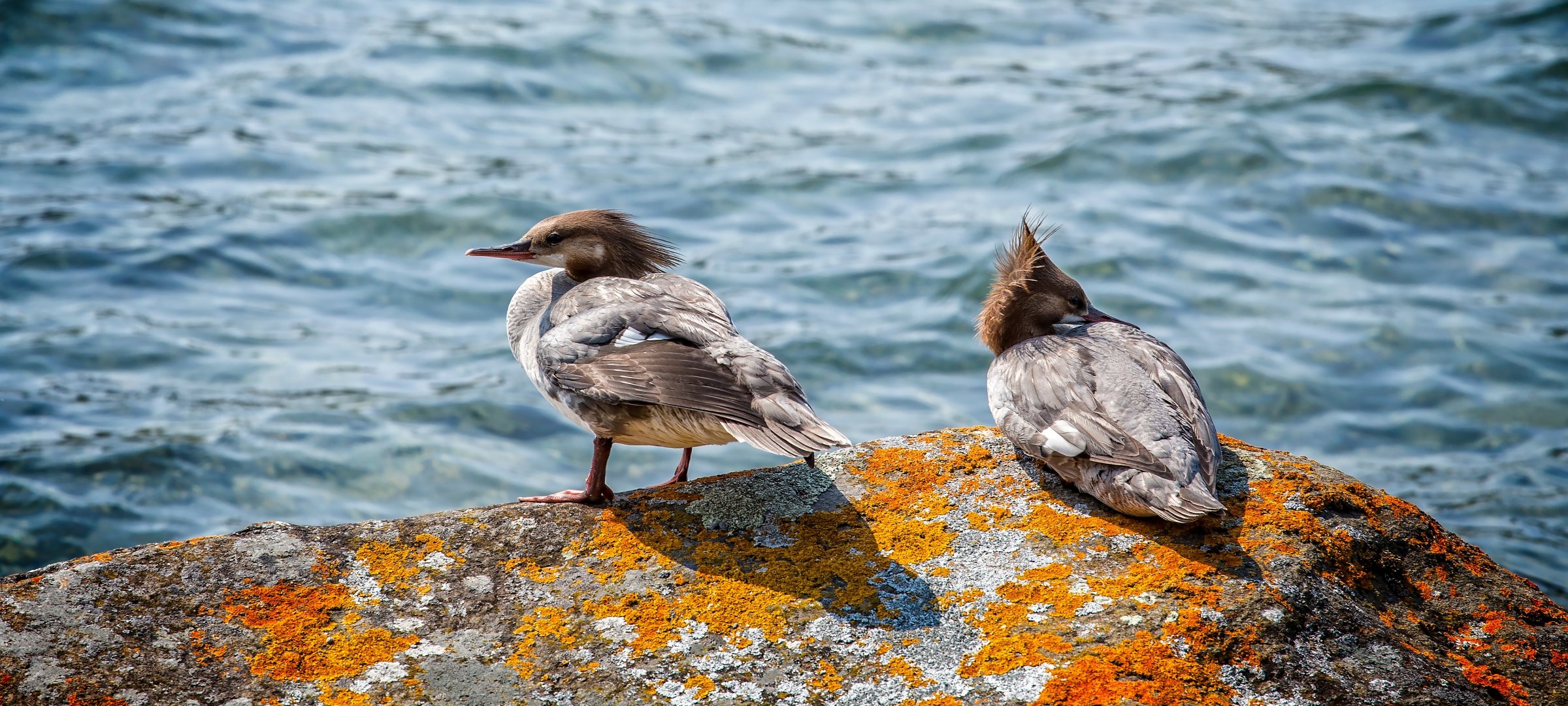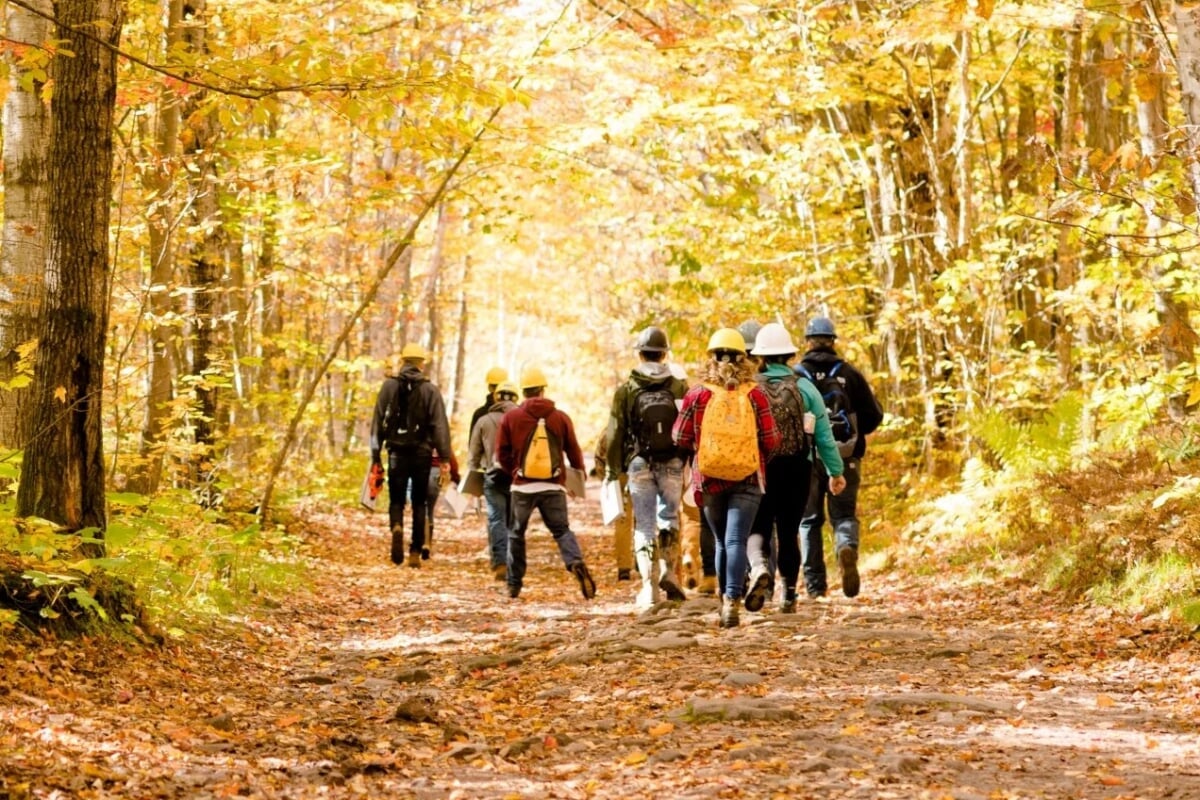Ecology is the study of interactions between organisms and their environment. It's a broad field, spanning biology, engineering, policy, and environmental management. There are numerous ecology specializations, from marine or microbial ecology to population and systems ecology. All have a common thread: Biodiversity and ecosystem services are essential for the well-being of humans and other living and nonliving organisms.
The study of ecology helps us solve problems and gain understanding about energy, nutrition, species abundance, human interaction, pests and diseases, natural disasters, and many other patterns. This data is applied to world solutions, like saving endangered species or combating climate change.
Applied ecology focuses on the practical application of ecological principles and knowledge to inform management decisions and conservation practices. These studies can help guide resource management decisions in forests and agriculture, help restore biodiversity along streams and wetlands, mitigate pollution in urban landscapes, sustainably develop new materials for buildings, inform policies, and more.
An understanding of ecological patterns, processes, and sustainability is at the core of a career as an ecologist. Solving complex environmental problems like population impacts, climate change, land use degradation, and altered nutrient cycles comes from a knowledge of fundamental science in ecosystem processes.
What Do Ecologists Do?
Applied ecologists study interactions between organisms and their environment, then use this data to make land management decisions, conserve habitats, restore natural areas, sustainably manage natural resources, control pollution, and more.
Ecologists have a variety of jobs ranging from conservation and restoration, to environmental management and policy making, to ecological engineering and land-use planning. These management decisions can be on a local level or expand to the biosphere.
Plant and Wetland Ecology
Study the interactions between an ecosystem's biotic factors (living things, like plants and animals) and abiotic factors (nonliving components, like water and soil) to understand ecosystem processes and patterns. Analyze nutrients in soil and water to determine the health and abundance of aquatic organisms and surrounding trees. Restore wetlands and coastlines with native grasses and protect wildlife. Plant and animal species living in transitional areas between terrestrial and aquatic ecosystems are indicators for much larger, global climate challenges. Knowledge gained here can help to mitigate climate change impacts on local and larger scales.
Communicating Natural Resources
Understand, analyze, communicate, and manage ecosystems in a scientific and sustainable way to benefit the coexisting relationships that humans have with the natural environment. By communicating ecological information, ecologists help other natural resource professionals, landowners, and the public to understand the benefits of sustainably managing natural ecosystems. Advocacy and policy change can play a major role in land management decisions intended to help prevent a further climate crisis. Understanding how to communicate natural resources and ecological services is the first place to start.
Biotechnology
Use and develop technologies to monitor, restore, conserve, and manage the environment. Produce energy from organic waste, exterminate pollutants in water or soil, examine productivity of natural resources and create new ways to sustainably harvest them. Explore genetics by using DNA sequencing to understand evolutionary relationships of species within ecosystems. Explore biological control mechanisms to stop the spread of invasive species. Assess genetic health and viability in endangered species. Use natural environmental patterns to create solutions for tomorrow.
Ecology and Evolutionary Biology
Study interactions between organisms and their environment, and the evolutionary process that produces and modifies life on Earth. Understand how ecological interactions and evolution are interwoven, focusing on behavior, biodiversity, conservation, and function, with scopes ranging from an individual species to entire ecosystems. Observe, collect, record, and analyze evolutionary biological data in the lab and in the field. Expand your knowledge of our planet’s interconnected ecosystems with studies of ecosystem sustainability, evolutionary dynamics, ecosystem function, human health, and the management and restoration of natural resources. You can work on advanced DNA analysis, confocal microscopy, cell sorting, chromatography, and more.
What Careers Are There in Ecology?
Ecologists play a crucial role in conserving Earth's ecosystems. They understand ecosystem dynamics, unraveling the complex web of relationships that contribute to biodiversity. This understanding is essential for predicting how ecosystems will respond to environmental changes and human activities.
Ecologists use this knowledge to conserve and manage forests and other ecosystems, developing strategies to protect and restore areas. They create solutions for mitigating and adapting to climate change based on the impacts of species and distribution, and help control pollution and increase environmental health by studying the ecological impacts of pollutants such as pesticides and plastic waste.
Between soil, hydrology, pests and diseases, climate change, invasive species, and natural disasters, the opportunities for a career in ecology are limitless.
- Field Ecologist
- Research Technician
- Environmental Analyst
- Field Naturalist
- Research Scientist
- Environmental Consultant
- Invasive Plant Technician
- Entomologist
- Mycologist
- Hydrologist
- Soil Scientist
- Conservation Biologist
- Water Resource Manager
- Climate Change Analyst
- Ecological Restoration Specialist
- Environmental Health and Safety Specialist
- Environmental Restoration Planner
- Industrial Ecologist
- Agricultural Engineer
- Biological Technician
- Sustainability Officer
What Skills Do Ecologists Need?
Professionals in ecology must be well-rounded in their depth of knowledge related to natural resources and environmental science. The foundational skills they need include biology, chemistry, statistics and other mathematics, and conservation. Social skills, including ethics and communication are also essential for understanding and managing natural resources, along with adaptability and problem-solving abilities. Both knowledge and passion for conservation and sustainable practices help the professional ecologist maintain a the appropriate balance of human and environmental needs.
Skills needed include:
- In-depth knowledge of ecology and sustainable ecosystem management
- Hands-on field skills in the management of natural resources
- Ability to conduct data collection and analysis, and the capacity to draw conclusions from the data
- Competence with spreadsheets and other software skills for data analysis and management
- Critical thinking and problem-solving skills that lead to alternative solutions to challenges
- Effective communication among team members, collaborators, and the public
- Persistence in research and development processes
- Active participation and engagement in projects and initiatives
- A deep commitment to sustainable practices and conservation
Ecologists combine what they learn in the field and in the lab with technology to assess environmental data and inform decisions that lead to positive changes in our environment. Ecology professionals typically have a mindset geared toward climate change response, ecosystem management, and sustainability.
What Tasks Do Ecologists Do?
The day-to-day tasks of an applied ecologist vary. That's what many people enjoy about this career. Here's a breakdown of some typical activities.
Fieldwork
Ecologists spent a lot of their time in the field. They:
- Conduct surveys on vegetation, wildlife, or aquatic organisms to collect data on species abundance, distribution, and health.
- Monitor ecosystems by measuring variables such as water quality, soil health, or atmospheric conditions.
- Collect samples of soil, water, plants, or animals for laboratory analysis.
- Assess habitats to evaluate the quality and suitability for various species.
Data Analysis
Ecologists take the results of fieldwork into labs and communities. They:
- Analyze collected data from field surveys using statistical software.
- Develop models to predict ecological outcomes and assess the impact of management decisions.
Research and Experimentation
Ecologists think deeply about how to solve current and future challenges for humanity and our planet. They:
- Design experiments to test ecological hypotheses and assess the effects of environmental changes.
- Stay up-to-date on scientific research.
Collaboration and Communication
Ecologists pull their findings together to create a larger impact with their work. They:
- Document projects and their data and prepare reports.
- Collaborate with other scientists and stakeholders on projects and initiatives.
Environmental Management
Ecologists create actionable steps to help maintain or address problems in the environments they study. They:
- Develop management plans for the conservation and sustainable management of natural resources.
- Design and implement ecological restoration projects to rehabilitate degraded ecosystems.
Policy and Advocacy
Ecologists are an important voice in speaking up for the health of the environment and the communities who rely on a healthy planet. They:
- Provide real-world data and expertise to lawmakers to help create and maintain environmental policies.
- Engage with the public to educate and promote awareness and understanding of ecological issues.
How Much Do Ecologists Earn?
Salaries in the ecology field vary widely depending on factors such as level of education, experience, geographic location, type of employer (government agency, nonprofit organization, consulting firm, etc.), and specific field of expertise within ecology (conservation biology, wildlife ecology, marine ecology, etc.). According to Payscale,Entry Level Ecologists (bachelor's degree) earn $44,768 per year while Senior Ecologists (PhD or many years experience) earn $71,760 per year.
$44,768
$57,206
$80,000
Figures from payscale.com, accessed April 2025.
The Future of Ecology
Ecology holds promise for both the planet and those who choose to enter the profession and become ecologists. Increased demand for environmental solutions, along with challenges like climate change, habitat degradation, pollution, and loss of biodiversity, are at a critical point. Ecologists are needed to develop and implement solutions to mitigate these impacts felt around the globe. Technological advancements are making it easier to access data, come up with innovative solutions, monitor ecosystems, and manage them more efficiently. Tools like drones, lidar, geographic information systems (GIS), and DNA analysis are allowing ecologists to do more than ever. Many companies, industries, and both government and non-profit agencies are focusing efforts on both sustainability and mitigating impacts on the environment. This shared concern is leading to increases in interdisciplinary collaboration. Ecologists are integrating knowledge from other fields, including data science, computing, and social sciences, into their work.
Across disciplines, ecologists will continue to develop strategies to help ecosystems and humanity address and adapt to environmental changes and challenges. Ecologists will help develop conservation plans, restore degraded landscapes, and find improved ways to utilize carbon sequestration. They'll continue to use their data-driven findings to influence natural resources policy. Their educational outreach to the public will also continue to be crucial, leading to better understanding biodiversity, sustainability, and other ecological issues.
Pursuing an Ecology Degree
There are several paths students can take to start a professional career in ecology. Most entry-level positions require at least a bachelor's degree. These tips can be helpful if you want to pursue a degree in an ecology field.
Tips for High School Students
For high school students who are considering a career in the ecology field, our academic advisor suggests:
- Focus on math and biology classes—studying statistics is particularly useful due to the amount of sampling that you'll be doing in your ecology career. Courses related to environmental science and conservation will be helpful, too.
- Research several applied ecology and other land management degrees, such as forestry, wildlife ecology and conservation, or others, to see which is your best fit.
- Talk with teachers, school advisors, friends, and classmates about the options to gain more perspectives and ideas on how to become an ecologist or another kind of ecology-focused professional.
- Do a job shadow. Contact natural resource professionals in your area to see about a ride-along or if you can talk to them about the work they do. Reach out to the Department of Natural Resources, US Forest Service, a regional or state fishery, or even private companies that work in natural resources to see what opportunities are available. Your local cooperative extension service office, which is typically administered through a state university, may also have ideas on how you can learn more about ecology jobs.
Choosing a College/University for Ecology
Selecting a school to where you want to study for a profession in ecology can be easier than you think if you keep these tips in mind:
- Research colleges and universities that offer ecology degree programs, paying special attention to the kinds of ecology offered. "Applied Ecology" is generally more hands-on with more outdoor labs. Many different programs across campus may be available. Ask your regional admissions counselor if you need help sorting through the options.
- Look into degree programs that may not have ecology in the name but are still ecologically focused, like forestry or natural resource management. You can ask program advisors in these degrees what the differences are to help you figure out what suits you best.
- Visit your top school choices and ask lots of questions about the degree program, available scholarships and financial aid, application requirements, and deadlines. Ask about co-ops and internships as well as on-campus research opportunities.
- Consider the amount of time in the classroom vs. in the field. If you want a job in the outdoors, now is the time to learn more about what it's like. Schools might offer a "camp" experience, sometimes called a field practicum, that will be valuable for your learning and also comes in handy at hiring time. Employers like graduates who have field experience.
- Apply to the schools you think are the right fit for you and your goals sometime between your junior year and the beginning of your senior year. Get the deadlines on your calendar so you don't miss them.
Tips for College Students
If you're a current college student, you can use these tips help ensure success along the path toward an ecology career:
- Work with academic advisors to choose the appropriate program and courses so that you'll be prepared with the knowledge and skills you need for a career in ecology.
- Gain experience by participating in ecology-focused activities through student and community organizations, co-ops and internships, professional conferences, and research projects.
- Form relationships with faculty members. These connections will help identify relevant ecology experiences and jobs, both during college and after graduation.
- Network with professionals at conferences, on-campus career fairs, and more. Connections with professionals in the field are invaluable during your job search and throughout your career.
- Keep an up-to-date resume and brush up on interviewing skills. See if your school has a career center that can help.


